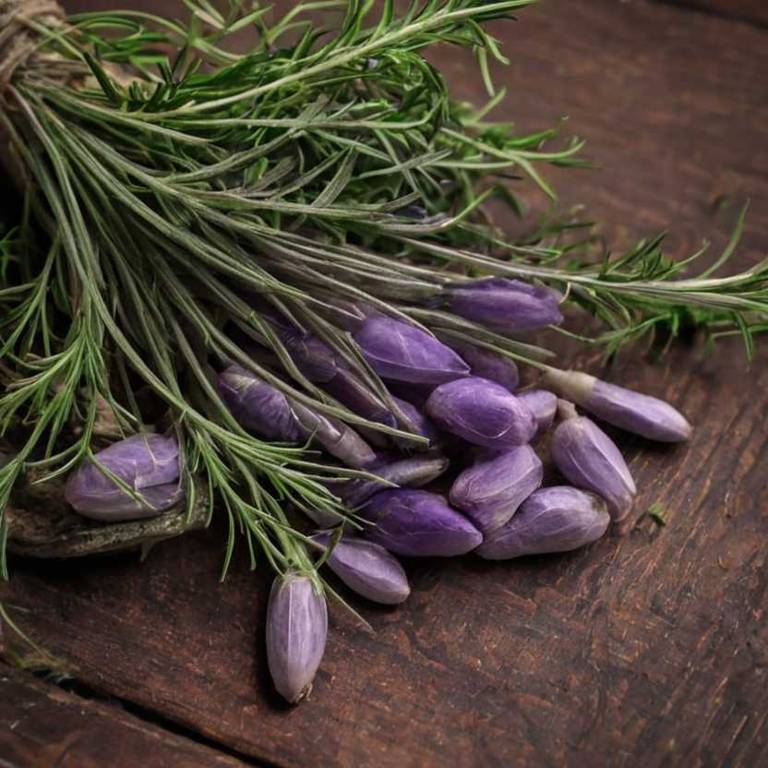By Leen Randell
Updated: Jul 06, 2024
10 Health Benefits Of Crocus Sativus (Saffron)

Crocus sativus, also known as saffron, has health benefits such as anti-inflammatory and antioxidant properties.
These medicinal properties help to improve symptoms of anxiety and depression, as well as reduce the risk of heart disease and cancer.
For example, saffron's ability to reduce inflammation has been shown to alleviate symptoms of postpartum depression and improve cognitive function in older adults, allowing them to live healthier and more active lives.
This article explains in details the 10 best health benefits of Crocus sativus.
1. Reduces depression symptoms
Crocus sativus reduces depression symptoms because of its unique bioactive compounds that exert a positive impact on mood and cognitive function.
Saffron's crocin and crocetin extracts have been shown to increase serotonin levels in the brain, thereby alleviating symptoms of depression such as sadness, hopelessness, and loss of interest.
Additionally, saffron has anti-inflammatory properties, which may help reduce oxidative stress and inflammation associated with depression.
2. Improves mood
Crocus sativus improves mood because of its unique bioactive compounds, particularly crocin and crocetin.
These molecules have been shown to modulate neurotransmitters such as serotonin and dopamine, which play a crucial role in regulating mood. By increasing the production of these neurotransmitters, saffron supplementation has been found to alleviate symptoms of depression, anxiety, and stress, promoting a sense of calm and well-being.
This natural mood-boosting effect makes saffron a promising alternative for managing mental health.
3. Reduces pms symptoms
Crocus sativus reduces PMS symptoms because of its potent anti-inflammatory and antioxidant properties.
The crocin and safranal compounds present in saffron have been shown to alleviate symptoms such as mood swings, bloating, and breast tenderness by regulating hormonal imbalances and soothing the body.
Additionally, saffron's ability to reduce stress and anxiety levels helps to mitigate emotional distress often associated with PMS.
4. Supports eye health
Crocus sativus supports eye health because it contains a unique combination of bioactive compounds that have been shown to possess potent anti-inflammatory and antioxidant properties.
These compounds may help protect the eyes against age-related macular degeneration and retinal damage caused by oxidative stress, while also improving visual acuity and reducing the risk of cataracts.
Additionally, saffron's ability to promote blood flow and reduce inflammation in the eye may help alleviate dry eye syndrome and other inflammatory conditions that can impair vision.
5. Enhances memory
Crocus sativus enhances memory because of its unique neuroprotective and cognitive-boosting properties.
The active compound crocin in saffron has been shown to increase the production of ATP, a molecule that fuels brain cells, improving their ability to communicate and store information.
Additionally, saffron's antioxidant and anti-inflammatory effects help protect neurons from damage, promoting healthy neural connections and reducing age-related cognitive decline.
6. Boosts libido
Crocus sativus boosts libido because it increases serotonin levels in the brain, leading to enhanced sexual desire and pleasure.
The antioxidant-rich spice also dilates blood vessels, improving circulation and increasing sensitivity during intimate encounters.
Additionally, saffron's aphrodisiac properties have been shown to reduce stress and anxiety, creating a more relaxed and receptive environment for intimacy.
7. Alleviates menstrual pain
Crocus sativus alleviates menstrual pain because of its potent anti-inflammatory and analgesic properties.
The active compound, crocin, has been shown to reduce prostaglandins, which are hormone-like substances that cause uterine contractions and lead to cramping during menstruation.
Additionally, saffron's antioxidant properties help to mitigate oxidative stress and inflammation in the body, further contributing to its ability to alleviate menstrual discomfort and improve overall well-being.
8. Reduces appetite
Crocus sativus reduces appetite because of its unique ability to influence the brain's reward system and metabolism.
The active compound crocin in saffron has been shown to bind to dopamine receptors, which helps reduce food cravings and increase feelings of fullness. Additionally, saffron may slow down gastric emptying, reducing hunger pangs by keeping the stomach fuller for longer.
This makes it a natural appetite suppressant for those looking to manage their weight or improve their overall eating habits.
9. Improves sleep quality
Crocus sativus improves sleep quality because of its ability to promote relaxation and reduce stress levels.
The bioactive compounds in saffron, particularly crocin and crocetin, have been shown to possess sedative properties that help alleviate symptoms of insomnia and anxiety.
By calming the mind and body, saffron extract can facilitate a deeper and more restful sleep, leading to improved overall sleep quality and increased energy levels throughout the day.
10. Has anticancer properties
Crocus sativus has anticancer properties because it contains a powerful compound called crocin, which exhibits potent antioxidant and anti-inflammatory activities.
These bioactive compounds have been shown to inhibit the growth of cancer cells, induce apoptosis (cell death), and even reverse multidrug resistance in certain types of tumors.
Furthermore, saffron's ability to modulate immune responses may enhance its potential as a complementary therapy for cancer treatment.